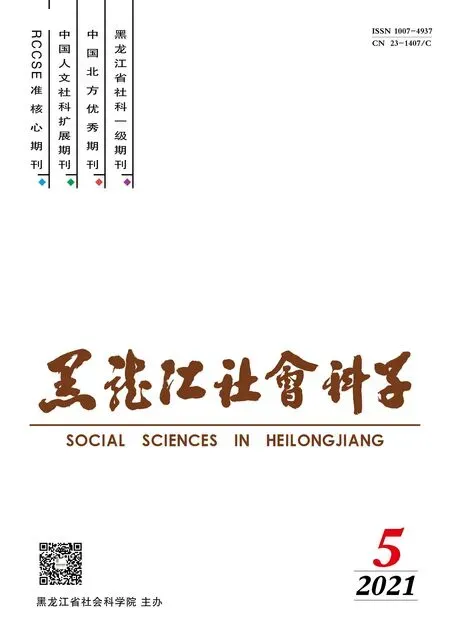ABSTRACTS
The Consciousness of Showing Kindness in Confucian Tradition——Represented by GU Xian-chengLI Ke-xin
(School of Philosophy and Society, Lanzhou University, Lanzhou 730000,China)
The Consciousness of Showing Kindness in Confucian Tradition
——Represented by GU Xian-cheng
LI Ke-xin
(SchoolofPhilosophyandSociety,LanzhouUniversity,Lanzhou730000,China)
Abstract:Chinese Confucian philosophy pays particular attention to the relationship between human nature and good and evil. The two concepts of human nature and good and evil can be said to complement each other. The positive determination of value principles such as benevolence and righteousness is a particularly strong academic and moral pursuit of Confucian scholars. Therefore, it has become a problem that can not be avoided and hesitated. Among them, the academic circles of the Ming Dynasty criticized the theory of “no good and no evil” of Yangming school most intensely, and GU Xian-cheng can be the representative among the critics. GU Xian-cheng believes that since ancient times, nature has its own definition, good and evil can not be equated, human nature and good are not harmful, and good and evil disappear, which will violate the value purpose of Confucianism and cause great social harm. Yangming’s theory of no good and no evil has the significance of emphasizing workmanship theory from ontology. The dispute between the two sides reflects the tension between the old and new theories. Clearly advocating the value principle of goodness is of extreme importance to specific social existence, and it is also the academic style of Confucian scholars who are scrupulous about morality and morality.
Keywords:Confucian Tradition; Nature has no Fixed Noumenon; No Good and no Evil; Good Nature; Good Intentions; Evil Intentions; Good Consciousness
AnalysisofLandOwnershipFactorsinRuralSocialGovernance
DUAN Xu-zhu
(SchoolofGovernmentManagement,HeilongjiangUniversity,Harbin150080,China)
Abstract: The rural land property right system shapes the basic interest structure of rural society. This interest structure affects the formation of autonomous power structure and determines the behavior choices of farmers and autonomous organizations. The common ownership of land leads to the relative closeness of farmers’ collective to a certain extent. Villagers’ autonomous organization is not only the organizational form of villagers’ autonomy, but also the agent of agricultural land ownership. There is an internal contradiction between the behavioral logic of the two organizations. Therefore, we should further clarify the relationship of rural land property rights, improve the realization mechanism of rural land rights and interests, and promote the coordination and order of rural social governance.
Keywords:Rural Society; Farmer; Autonomous Organizations; Government; Land Ownership
AnAnalysisoftheNewPathofAmericanForeignCultural
PublicityinthePostColdWarPeriod
WANG Zhi-li
(SchoolofArtandMedia,TongjiUniversity,Shanghai200092,China)
Abstract:In the post Cold War period, Joseph Nye’s “soft power” has become an important manifestation of national strength. American foreign publicity began to focus on culture and adopt more secret publicity methods. News media products, Hollywood films and overseas exchange projects have become a symbol of American soft power and an important carrier for the new publicity of American foreign culture. The American lifestyle, American values and capitalist ideology presented in these cultural products have completed their overseas arrival, although the communication process is slow, the communication effect is extremely significant, which is deeply engraved in the thinking of other countries’people. Although there is no “publicity”, but the people in other countries who do not know the truth have been infiltrated in such an American life and cultural atmosphere for a long time, and they will naturally be full of good feelings and yearn for the United States. So far, the new cultural publicity of the United States has also achieved the expected results quietly, and completed the global marketing of American ideology.
Keywords:New Publicity; Post Cold War Period; American Ideology; Cultural Hegemony
ChangesofForestVegetationinMudanjiangRiverBasinintheLate
QingDynastyandtheEarlyRepublicofChina
SU Xun-bo
(SchoolofHistoryandCulture,MudanjiangNormalUniversity,HeilongjiangMudanjiang, 157001,China)
Abstract: Mudanjiang River Basin has always been an important primitive forest area in China in history, with rich wood reserves. Since modern times, due to the influx of a large number of immigrants, disorderly mining and predatory logging of Russia, Japan and other countries, by the early 1930s, the forest vegetation in the region had shrunk significantly, the soil erosion was becoming more and more serious, the species and quantity of animals and plants in the forest had decreased sharply, and the forest ecology had a deteriorating trend. Reviewing this history and drawing lessons from it is still of practical significance for forest protection in Mudanjiang River Basin and Northeast China.
Keywords:Late Qing Dynasty and Early Republic of China; Mudanjiang River Basin; Forest Vegetation

